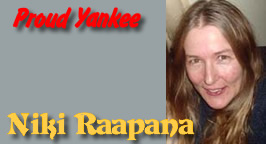Other
Raapana
Articles:
CAFTA, the EU & Communitarian Law
DEADLIEST AGREEMENTS
By Niki Raapana
May 7, 2006
NewsWithViews.com
Today's President has the power to make executive agreements with foreign powers that directly affect U.S. domestic policy.
This happened because the U.S. Constitution grants presidents almost unchecked power in regards to American foreign policy. While only the U.S. Congress has the authority to declare war, U.S. Presidents, starting with Washington, used their position to make executive agreements with agents of foreign governments.
Also, over the last century, U.S. Presidents have made numerous commitments of American economic and military aid to nations without a formal, Senate ratified treaty. This was true for Israel, Eisenhower and Kennedy both had agreements with South Vietnam, Nixon went to China and Moscow, etc.
In many cases, the Senate has fully approved of treaties that grant even more power to the presidency and to their foreign partners. In 1949, the Senate approved Truman's agreement to enter into the North American Treaty alliance (NATO). It may have taken over fifty years to expand it, but by 2005, for the first time in U.S. history, foreign troops from Mexico and Canada were deployed onto U.S. soil, after Hurricane Katrina.
As early as 1964, the U.S. Congress was passing resolutions granting the U.S. President broad powers to "take all necessary measures to repel any armed attack against the forces of the United States and to prevent further aggression." Known as the Tonkin resolution, the Congress deemed it to be: "Consonant with the Constitution and the Charter of the United Nations�."
By 1992, both the outgoing and incoming U.S. Presidents "agreed" to adopt the United Nations sustainable development plan for Local Agenda 21 in the United States. Based on the chain of command, it's only natural that our people must all eventually endorse the global system of communitarian law.
The UN Local Agenda 21 Programme for Development is an executive agreement endorsed by President Bush Sr. and Jr. and President Clinton. By 1993, every federal agency in the U.S. changed their mission to promote sustainable development principles, after our presidents agreed to adopt the UN plan.
It doesn't matter that this new law and the new global system were not exactly approved by the U.S. Congress. Presidential executive agreements have been standard for so long the "great silences" in the Constitution slipped up and caught us in the rear. Besides, the Congress usually approves the necessary legislation to support the global market and the global police state.
By the looks of things, free and independent nations that protect and defend the rights of their individuals are going extinct. If I only read what the communitarians write, I'd be sure it's all over but the crying. The law's in place; it should be easy. What's amazing to me (and maybe to them) about this new kind of global slavery is, America still makes the kind of men and women who can send it all right back where it came from, again.
My daughter and co-writer Nordica turned 21 last week, and we went out to a local Anchorage watering hole. I had arranged to meet with an email contact I met thorough our ACL work, so I spent the first half of the evening in deep discussion with a local Muslim Bible historian who taught me a lot in a very short time.
As that's a real rarity for me, and he was a great guy too, we gave Nordica relief from the intensity of my constant company.
Nordica did what any red-blooded American would do on their 21st birthday. She watched the Mariners break their losing streak with an American captain of a 113 ft fishing boat. He later told us that the Discovery Channel taped his boat in a show on the king crab industry called "Deadliest Catch" (He's the un-superstitious captain of Time Bandit who leaves Dutch Harbor on a Friday. He assured us it's not his boat shown sinking later on.)
Cap'n Jon told us he's been through every kind and size of hurricane or typhoon the ocean can throw at him. (He also wondered why the hurricanes he goes through that are bigger than the ones that hit the south don't ever get named in English.)
As the night progressed, he painfully explained the industry. The State of Alaska grants crab processing rights only to the six Japanese owned Bristol Bay processors. He is not allowed to choose/use unauthorized American processors for his catch. The canneries set the prices, not the fishermen.
He very sadly told us there were 170 boats fishing in Bristol Bay ten years ago, whereas today there are only 80 boats. He asked if we understood what the sale of 90 large fishing boats does to a local economy based on supplying the boats. (I do. I saw the effects down in Ketchikan in 2004. The owner of the famous 49er bar called the once thriving lumber and fishing center a ghost town. It has been the scene across America for decades.)
At forty-three, Jonathan is a boat captain with a lot of scars and bone grafts to prove he lives the life. In a healthy society, he would be in the middle of his career, training young captains to take over when he gets too old for his work. But his crew works for wages now (no %) and he's required to tithe 10% off the top of his catch to the Alaska Regional Native Association, even though the Natives were never deep sea crabbers. As far as he knows, his is the only industry required to tithe to local Indians. (From what I understand this also applies to any industry that depletes the natural resources of Alaska.)
He was on his way to Seattle to list his boat for sale. He said fishing isn't worth it anymore in the new system.
How many skilled American business owners like Jonathan have quit their chosen professions because global trade is devouring local industry? Makes me think about that farmer's sign on the road outside Madison, Wisconsin on the way up to Baraboo in 1996. It said, "What you gonna eat when the farm's all gone?"
References:
1.
How American Foreign Policy is Made by John Spanier and Eric M.
Uslaner, Praeger University Series, Praeger Publishers, New York, 1974.
p. 47 (Tonkin resolution), p. 44 (NATO), p. 43 (Israel) p. 42 ("great
silences")
2. US seeks more NATO help on Katrina, (Reuters), September
8, 2005.
3. Discovery
Channel
� 2006 Niki Raapana- All Rights
Reserved
Niki Raapana is the co-founder of the Anti-Communitarian League (ACL), an online research center for studying outside the box.
Niki
is also the recent author of the non-fiction biography, 2020. Unlike the
ACL website (which is a massive endeavor) 2020 introduces the global community
government in 100-pages using laymen's terms for average readers. Price:
$20.00, includes S&H. Send check or money order to: Nordica Friedrich-2020,
P.O. Box 231941, Anchorage, Alaska, 99523 or order online using PayPal
at the ACL: http://nord.twu.net/acl
E-Mail: nikiraapana@gmail.com
It may have taken over fifty years to expand it, but by 2005, for the first time in U.S. history, foreign troops from Mexico and Canada were deployed onto U.S. soil, after Hurricane Katrina.












